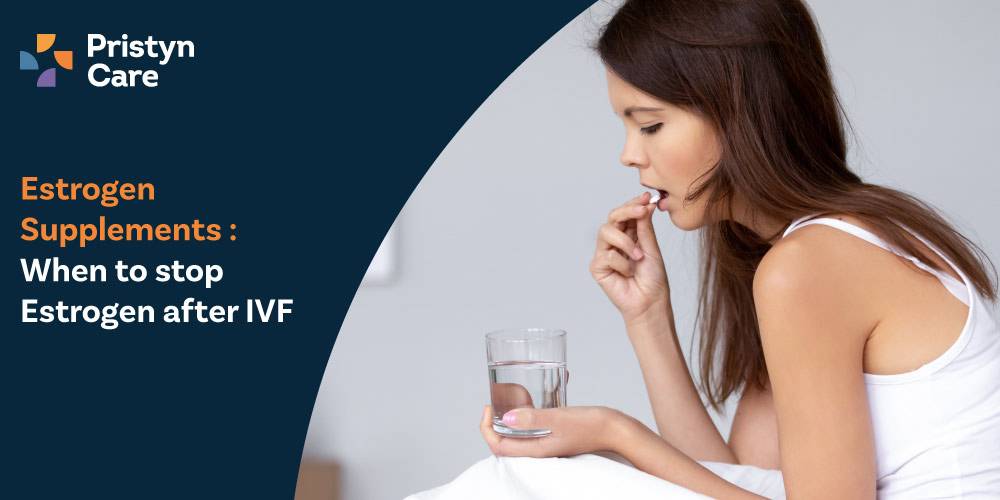
When you begin your journey of IVF treatment, every medicine and injection feels like a crucial part of your journey. And, among the most common hormone medication is estrogen. This hormone is crucial for building uterus health and receptivity for embryo implantation and sustaining full-term pregnancy.
Once the embryo transfer is done, the common question that a lot of women ask is, “When can I actually stop taking estrogen supplements?
Table of Contents
Why estrogen is crucial for IVF treatment
Estrogen prepares your body for pregnancy. During a natural cycle, ovaries produce estrogen that helps in building up a thick, cushiony uterine lining that creates a perfect environment for an embryo to get implanted. In IVF procedures, especially the one where a doctor recommends frozen embryo transfer, they prescribe estrogen supplements to ensure that the lining is suitable for a successful pregnancy. Estrogen supplements boost your body and especially take care of uterine health. This helps in improving embryo transfer success rate and overall health of the uterus. These supplements are usually stopped after about 8 weeks of pregnancy,
When does the estrogen supplement begin during the IVF treatment?
In a lot of cases, women start taking estrogen in the second half of their cycle or immediately after their menstrual cycle starts. Depending upon the doctor’s prescription, there are options for pills, injections, or even patches. It may sound a little too heavy, but it’s not and every dose is essential for the body to be ‘baby-ready’. This is an integral part of post embryo transfer care and sets a strong foundation of successful implantation.
When to stop estrogen after embryo transfer?
This is quite an important question for several parents-to-bee.
The answer depends on the following scenarios:
If your UPT (urine pregnancy test) is positive and the doctor confirms it as well:
Usually, during this phase, doctors keep you on an estrogen supplement. To adjust to the early pregnancy phase, your body needs some extra hormonal support till the time the placenta serves the role. So even after embryo transfer, estrogen keeps supporting the pregnancy and maintains a higher embryo transfer success rate.
If your pregnancy test comes negative:
Your doctor would stop estrogen (and progesterone) hormone medication. It will allow the body to restore its natural hormonal balance and rhythm.
It’s normal to feel a little nervous stopping estrogen, especially when your body has become habitual of the regular doses. Remember, have faith in your doctor, and discuss your discomfort amidst the change in the medication plan so that they can decide what’s the best way forward.
What to do after embryo transfer to increase success?
Many women feel a sense of relief with a tinge of anxiety in those days after the embryo transfer. You may feel hypervigilant from every abdominal sensation or cramp, whether it’s a good sign or not.
In real, symptoms at this stage can vary for different women:
- Some women may experience bloating or mild cramps
- Others may not notice any changes at all
- Spotting may happen but it may not necessarily mean a warning sign
What’s of utmost importance is that you take care of yourself after the embryo transfer. The following things work as embryo transfer success tips and aid to increase chances after embryo transfer.
So, if you’ve been too curious about how to increase chances after embryo transfer, here’s what may help you:
- Take doctor’s prescribed medication without skipping: Stick to your doctor’s without meddling. These medications in measured doses work a lot on your body and gynecologists know the best!
- Overall gentle and active routine works wonders: Light movement is fine—short walks, gentle stretching—but avoid anything too intense.
- Nourishing foods are a must: Fresh vegetables, lean proteins, whole grains, and healthy fats. These are the best natural nutrient sources for your body and quite helpful to increase chances after embryo transfer.
- Hydrate, rest, and don’t exert too much: These simple yet super effective habits allow your body to stay balanced and resilient.
- Keep stress in check: indulge in relaxing activities like deep breathing, reading mindfully, enjoying a cozy cup of tea, and unplugging from the world for some time. This journey builds you stronger.
3 Days Post Embryo Transfer Symptoms
Three days after the embryo transfer, it’s like a transition phase involving a lot of hope and nervousness, all at once, hopeful but nervous. There can be some discomfort or not at all, both are normal. Try not to read too much into every sensation, it can be tricky, but what is happening inside is still too early to assess. The confirmation comes with your pregnancy blood test around days 10 to 14. Being aware of 3 days post embryo transfer symptoms can ease your hyper alert state of mind.
When to call your gynecologist?
If something consistently feels off and you notice any of the following things, speak to a gynecologist:
- You experience heavy and painful bleeding.
- You have confusion regarding when to discontinue estrogen or any other meds.
- Overwhelm is driving you off and you need a reassuring advise
Your fertility specialist and the team are always there by your side, to handhold you through the IVF journey and boost embryo transfer success rate.
Stopping estrogen after embryo transfer is a carefully monitored step that your doctor advises. Keep being gentle and your mindset can make or break the game. Celebrate every step toward your healthy pregnancy. Book a consultation at Pristyn Care Ferticity and take the next step toward building the family of your dreams with a little one.






